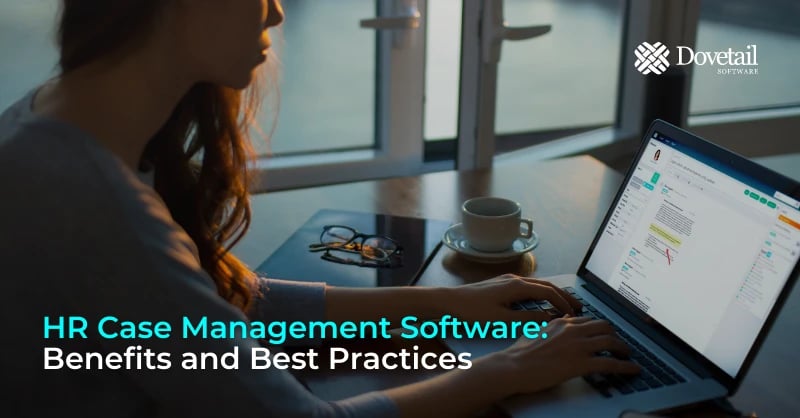
HR departments have many critical functions, and one of them is managing cases that are submitted to the department. Over the years, HR Case Management has become increasingly important in providing a positive employee experience as it is an indispensable tool for ensuring efficient and effective management of employee questions, inquiries and requests. In this blog post, we will look at the different types of HR cases, the benefits of HR case management software, and best practices.
What is HR Case Management?
HR Case Management is the process by which HR departments resolve inquiries and questions that employees submit to them. Typically, the inquiries and requests are submitted and managed within the system. Within such a system, employees can track how their queries are being resolved and by whom.
Having a good HR Case Management process is a part of effective HR Service Delivery and HR Shared Services. The process helps ensure that HR professionals are providing excellent service to employees while also ensuring that cases are resolved in a timely and efficient manner.
Types of HR Cases
HR cases are queries or issues employees may encounter that they need HR to resolve. Some of these can be related to:
- Onboarding: New employees often have many questions about the organization, key HR processes and procedures, policies, and benefits as they begin their journey into a new organization. HR case management software is a great tool to answer their questions and provide a positive employee experience as their journey commences.
Discover more in Case Study: Dovetail Case Management Software Boosts Productivity and Onboarding Experience for Leading Mutual Insurance Company.

- Benefits: This function also becomes more efficient using case management software. There are many questions that arise, ranging from Open Enrollment to processing claims and changing dependents. Investing in case management software will help HR and benefits specialists have standard questions answered easily and quickly, so they can focus on resolving more complex issues.
- Leave: Managing leave can become complicated as each employee’s life situation is unique and can change without notice. However, with case management software, the HR team members can address each employee’s unique needs promptly and in compliance with statutory requirements.
- Employee grievances: Employee relations cases can also be complicated. Employees are usually trained and coached, so they collaborate professionally and cordially with their peers. However, there are still instances where Employee Relations specialists or the HR function must intervene to resolve disputes between employees. Case management software is a critical tool for ER specialists to manage and resolve grievances in a timely and professional manner.
Discover more in Case Study: Multi-Billion Dollar Soft Drinks Distributor Improves Employee Relations With Dovetail Case Management Software.
- Policies & procedures: There are always questions from employees that sound like, “What should we do in this scenario?” and “How should we do it?” There are usually policies and guidelines that can answer these questions. Case management software combined with an Employee Portal can help provide the answers or guide employees to FAQs stored within the system.
Learn more in Case Study: Tower Health Adopts Dovetail Employee Portal to Improve the Employee Experience of Work.

- Performance: Employees may want to know how their performance is being measured and if there are compensatory benefits associated with their performance, like merit increases and bonuses. This is another type of query that your organization can quickly address through case management software.
- Payroll & taxes: An HR case management system helps payroll specialists focus on payroll administration by providing some documented responses. It also creates pockets of time for them to resolve those complex problems that do arise and need special attention.
- HR Technology/HRIS: Capture and manage all HR technology requests within the HR Case Management system. Examples such as: new position records, BI Report requests, org changes, updates to job titles, work hours, locations etc.
The benefits of HR Case Management include:
Immediate Access
One of the biggest advantages of HR Case Management software is that it gives employees immediate access to HR advice. With the software, employees can submit their queries or issues directly and receive a quick response. This not only improves employee satisfaction, but it also helps HR teams manage their workload more efficiently.
Case Status Tracking
Both employees and HR can track the status of each case by giving them ticketing numbers. This allows employees to easily follow up on their queries and receive updates on their case’s progress. For HR teams, this feature allows them to prioritize cases based on their urgency and ensures that nothing falls through the cracks.
HR Case Prioritization Through Service Level Agreements (SLA)
Cases can be prioritized and assigned through the HR Case Management system using Service Level Agreements (SLAs). This helps HR address a myriad of issues in a timely and efficient manner. For instance, if an employee reports harassment or discrimination, the case would be classified as high priority and assigned to an HR representative immediately for investigation and resolution. On the other hand, a routine benefits inquiry may be classified as low priority and added to the queue of cases for the next available HR representative to address when they have the time.
Enabling Rapid Escalation
It is easy to pass cases to other employees, teams, or management with all the information needed already there. This is critical to providing a positive employee experience. Cases that linger with an inexperienced HR employee not only delay the cases from being resolved but can make the resolution of the case more complicated than it needs to be. The software can prevent this by ensuring it goes to the right HR person with the requisite experience to efficiently resolve the case.
Grievance Reporting
Investigations may become more manageable as employees are provided with a standard template to describe and communicate complaints. When all the information is accessible in one place in a standard format, HR can respond with a customized response to each complaint. This not only makes the process more efficient, but it also ensures consistency in HR practices.
Read 2023 HR Compliance: Navigating the New Landscape with Dovetail and Mineral.
Workflow Automation
To reduce the workload on HR representatives and improve efficiency, HR Case Management offers workflow automation capabilities. An example is automated case routing, where cases are automatically assigned to the appropriate HR representative based on the type of issue and the employee's location or department.
Take a look at this short clip where we discuss an example of workflow automation in HR Case Management:
Improving Collaboration
Multiple team members can collaborate to resolve complex cases as they all have access to the same information at the same time. This not only improves the efficiency of HR operations but also fosters collaboration and teamwork within the HR department.
Conclusion
HR Case Management is an essential function of HR departments, responsible for managing various employee-related queries and issues. It is crucial for ensuring excellent service delivery and a positive employee experience and provides HR teams with many benefits, including immediate access, status tracking, prioritization, enabling rapid escalation, grievance reporting, workflow automation, and improving collaboration.
By adopting it, HR teams can streamline their operations, manage their workload more efficiently, and prioritize their tasks based on their urgency. Additionally, it enables HR to respond quickly to employee queries and concerns, providing a better employee experience. Workflow automation and knowledge base access help reduce repetitive questions, allowing HR teams to focus on more complex issues. HR case management software also helps ensure compliance with HR policies and regulations.





























.jpg)
